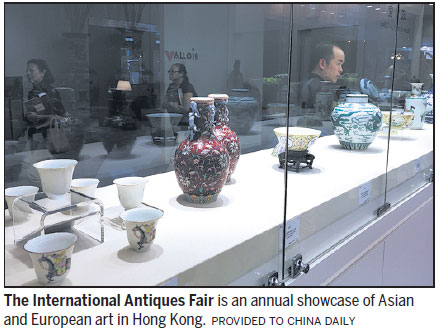How will the antiques market perform this year? What kinds of items will become popular among collectors? And, will vintage attract young people?
The answers to such questions can be found at the 10th International Antiques Fair, which will return to Hong Kong Convention and Exhibition Centre over May 27-30.
At the annual fair there will be some 70 exhibitors, mainly from Asia and Europe, showing largely Asian paintings, ceramics, Buddhist art and European decorative pieces.
Every year the fair holds a themed exhibition. Objects that center around the rooster will be the focus as this year marks the Year of Rooster on the traditional Chinese zodiac chart.

The pronunciation of rooster in Mandarin, ji, is similar to that of the character meaning "lucky". Therefore, roosters recur as a subject in many antiques as a best wish.
Last year, the exhibition showed ceramics produced under the guidance of Tang Ying, a Qing Dynasty (1644-1911) artist who served at royal court. The objects were loaned from collectors.
The fair will see lectures on porcelain, jade wares and collecting.
Tea experts from Japan and China's Hong Kong and Taiwan will demonstrate tea rituals at the fair, showing the tea culture of Song Dynasty (960-1279) and its influence on Japanese tea culture.
Antiques collector and dealer William Chak and his wife, Priscilla Lau, launched the International Antiques Fair in 2008. It was at first dedicated to Asian art, and last year, introduced European antiques to cater to an increasing interest from Asian buyers.
The coming fair will see an increase of French exhibitors, who will bring classic European furniture, paintings and marble sculptures.
Chak says he wanted to introduce an antique fair of European styles in Hong Kong, which has been dominated by auctions and contemporary art fairs.
"I first attended antique fairs in London at age 17. The relaxing atmosphere impressed me," says Chak, now 59. "People were there not to bargain for goods but to appreciate others' collections and exchange views."
Not only did Chak want to recreate that kind of fair and atmosphere in Hong Kong. He also felt that the art market began to boom on the mainland around 2000, and "Hong Kong could be a gateway for mainland collectors to acquire collecting experience and to reach the international market".
But by that time, international auction houses like Christie's and Sotheby's had already conducted antique sales in Hong Kong.
Chak and other dealers were frequent bidders for such sales.
Still he believed the city needed an antiques fair.
"A difference between a fair and an auction is that at a fair, people have more time to communicate with exhibitors and to decide whether to buy or not.
"While at an auction, the bidding runs fast. The object is sold in a flash, before you have a thorough consideration."
At the beginning there were few mainland visitors at the fair. But gradually it has attracted a number of collectors and exhibitors, and a bulk of them are from Beijing, a hub of classic Chinese art.
Chak says they began to hold road shows for the fair in Beijing and Shanghai last year. They want to reach more dealers and collectors, and are keen to expand the fair to the mainland.
Chak says some local governments have reached out to them in the hope of holding the fair in their cities. "We are happy to bring a lineup of international dealers to the mainland."
Chak says the fair normally has some 70 exhibitors from across the world, and the total value of their objects may surpass hundreds of millions of HK dollars.
"We hope that there will be preferential tax policies."
Christian Deydier, a French dealer who regularly exhibits at the fair, says for Chinese collectors and dealers who are new to an international market, attending a fair is part of the lot of "homework" they should do if they want to make collecting a long-term commitment.
"Collectors need to go to a museum, read books, talk to dealers and touch the objects at the fair, as it's very difficult to be a collector."
linqi@chinadaily.com.cn
